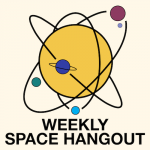Podcaster: Host : Fraser Cain ; Guest: Amber Dubill, Dr. Moiya McTier, C.C. Petersen, Marie-Liis Aru

Title: Weekly Space Hangout – Sailing Away Using Diffractive Solar Sails, with Amber Dubill
Link: Cosmoquest: http://cosmoquest.org
Description:
Today’s story:
- KREEP on the Moon.
- Neptune is cooling down.
- Magellanic clouds smashing together!
- Axiom Space AX-1 arrives at the ISS. Good? Bad?
Host: Fraser Cain ( @fcain )
Special Guest: Tonight we are very excited to welcome Amber Dubill from JHUAPL, the Johns Hopkins Applied Physics Laboratory, to the WSH. Amber has worked on both IMAP and DART, and also has a keen interest in advanced solar sail design concepts.
Solar sails have long been theorized as being a viable means of spacecraft propulsion — eventually — and we do seem to be moving closer to their being a reality… In June 2019, the Planetary Society successfully launched their crowdfunded, proof-of-concept LightSail 2, and it is still going strong! In fact, you can check on its current status here: https://secure.planetary.org/site/SPageNavigator/mission_control.html
Meanwhile, in Rochester NY, Dr. Grover Swartzlander from Rochester Institute of Technology (RIT) was developing a new approach to solar sail design – one that could potentially allow spacecraft to photograph the poles of the sun for the first time! In April 2019 RIT and Dr. Swartzlander were awarded a 2019 NIAC Phase 2 award to explore the feasibility of diffractive solar sails! (https://www.rit.edu/news/nasa-announces-funding-rit-professor-develop-novel-diffractive-solar-sails)
As a mechanical engineering student at RIT, Amber worked closely with Dr. Swartzlander on the diffractive solar sail design, and their collaboration continues today.
Amber started her experience on low cost, high risk CubeSats space at RIT as a student and at NASA Langley Research Center (LaRC). This evolved into research on advanced technology concepts for spacecraft. She has developed expertise in the use of solar sailing, and has become a champion for diffractive solar sailing through collaboration on NASA Innovative Advanced Concepts.
She continues working to further develop diffractive solar sailing technology: a new type of massless, infinite propulsion, that will enable spacecraft to sail around our Sun and view it like never before.
To stay up to date with Amber’s research, follow her on LinkedIn (https://www.linkedin.com/in/amber-dubill) as well as on Facebook (https://www.facebook.com/amber.dubill).
You can learn more about Amber’s and Dr. Swartzlander’s collaboration in this podcast: https://soundcloud.com/rittigers/intersections-the-rit-podcast-ep-8-space-travel-and-toaster-sized-boats-in-the-sky
Regular Guests:
- Dr. Moiya McTier ( https://www.moiyamctier.com/ & @GoAstroMo )
- C.C. Petersen ( http://thespacewriter.com/wp/ & @AstroUniverse & @SpaceWriter )
- Marie-Liis Aru ( https://www.bymarieliis.com/ & https://www.instagram.com/p/BL-0VW4Ah2j/?hl=en )
Today’s sponsor: Big thanks to our Patreon supporters this month: Rob Leeson, David Bowes, Ron Diehl, Brett Duane, Benett Bolek, Mary Ann, Frank Frankovic, Michael Freedman, Kim Hay, Steven Emert, Frank Tippin, Rani Bush, Jako Danar, Joseph J. Biernat, Nik Whitehead, Semyon Torfason, Michael W, Cherry Wood, Steve Nerlich, Steven Kluth, James K Wood, Katrina Ince, Phyllis Foster, Don Swartwout, Barbara Geier, Steven Jansen
Please consider sponsoring a day or two. Just click on the “Donate” button on the lower left side of this webpage, or contact us at signup@365daysofastronomy.org.
Or please visit our Patreon page: https://www.patreon.com/365DaysOfAstronomy
End of podcast:
365 Days of Astronomy
=====================
The 365 Days of Astronomy Podcast is produced by Planetary Science Institute. Audio post-production by Richard Drumm. Bandwidth donated by libsyn.com and wizzard media. You may reproduce and distribute this audio for non-commercial purposes.
This show is made possible thanks to the generous donations of people like you! Please consider supporting to our show on Patreon.com/365DaysofAstronomy and get access to bonus content.
After 10 years, the 365 Days of Astronomy podcast is poised to enter its second decade of sharing important milestone in space exploration and astronomy discoveries. Join us and share your story. Until tomorrow! Goodbye!

